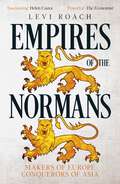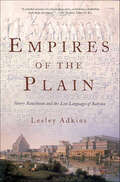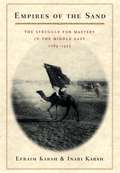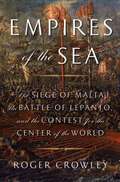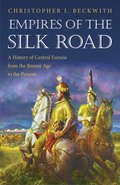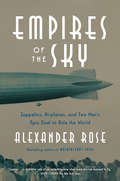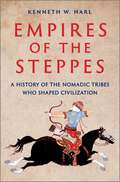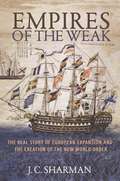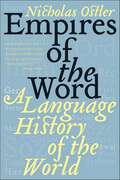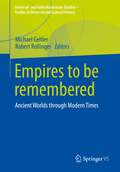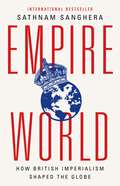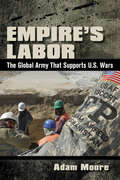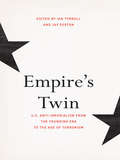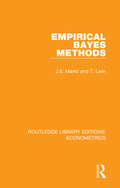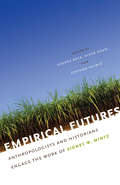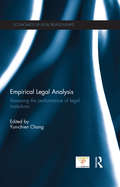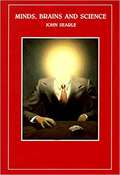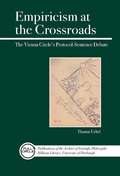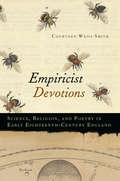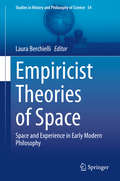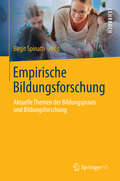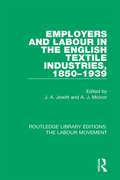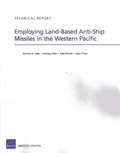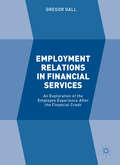- Table View
- List View
Empires of the Normans: Makers of Europe, Conquerors of Asia
by Levi Roach'In this fascinating, panoramic account, Levi Roach brings an expert eye and page-turning energy to the telling of their extraordinary story' Helen Castor, bestselling author of She Wolves'A fresh retelling of the story of the Normans . . . written with enthusiasm and brio' Marc Morris, bestselling author of The Anglo-SaxonsHow did descendants of Viking marauders come to dominate Europe, the Mediterranean and the Middle East? It is a tale of ambitious adventures and fierce freebooters, of fortunes made and fortunes lost. The Normans made their influence felt across all of western Europe and the Mediterranean, from the British Isles to North Africa, and Lisbon to the Holy Land. In Empires of the Normans we discover how they combined military might and political savvy with deeply held religious beliefs and a profound sense of their own destiny. For a century and a half, they remade Europe in their own image, and yet their heritage was quickly forgotten - until now.
Empires of the Plain: Henry Rawlinson and the Lost Languages of Babylon
by Lesley Adkins"Well-told story of a life dedicated to scholarship, with great adventures and derring-do an unexpected bonus." - Kirkus ReviewsFrom 1827 Henry Rawlinson, fearless soldier, sportsman and imperial adventurer of the first rank, spent twenty-five years in India, Iran, Iraq and Afghanistan in the service of the East India Company. During this time he survived the dangers of disease and warfare, including the disastrous First Anglo-Afghan War. A gifted linguist, fascinated by history and exploration, he became obsessed with cuneiform, the world's earliest writing. An immense inscription high on a sheer rock face at Bisitun in the mountains of western Iran, carved on the orders of King Darius the Great of Persia over 2,000 years ago, was the key to understanding the many cuneiform scripts and languages. Only Rawlinson had the physical and intellectual skills, courage, self-motivation and opportunity to make the perilous ascent and copy the monument. Here, Lesley Adkins relates the story of Rawlinson's life and how he triumphed in deciphering the lost languages of Persia and Babylonia, overcoming his brilliant but bitter rival, Edward Hincks. While based in Baghdad, Rawlinson became involved in the very first excavations of the ancient mounds of Mesopotamia, from Nineveh to Babylon, an area that had been fought over by so many powerful empires. His decipherment of the inscriptions resurrected unsuspected civilizations, revealing intriguing details of everyday life and forgotten historical events. By proving to the astonished Victorian public that people and places in the Old Testament really existed (and, furthermore, that documents and chronicles had survived from well before the writing of the Bible), Rawlinson became a celebrity and assured his own place in history.
Empires of the Sand: The Struggle for Mastery in the Middle East, 1789-1923
by Efraim Karsh Inari KarshEmpires of the Sand offers a bold and comprehensive reinterpretation of the struggle for mastery in the Middle East during the long nineteenth century (1789-1923). This book denies primacy to Western imperialism in the restructuring of the region and attributes equal responsibility to regional powers. Rejecting the view of modern Middle Eastern history as an offshoot of global power politics, the authors argue that the main impetus for the developments of this momentous period came from the local actors. Ottoman and Western imperial powers alike are implicated in a delicate balancing act of manipulation and intrigue in which they sought to exploit regional and world affairs to their greatest advantage. Backed by a wealth of archival sources, the authors refute the standard belief that Europe was responsible for the destruction of the Ottoman Empire and the region's political unity. Instead, they show how the Hashemites played a decisive role in shaping present Middle Eastern boundaries and in hastening the collapse of Ottoman rule. Similarly, local states and regimes had few qualms about seeking support and protection from the "infidel" powers they had vilified whenever their interests so required. Karsh and Karsh see a pattern of pragmatic cooperation and conflict between the Middle East and the West during the past two centuries, rather than a "clash of civilizations." Such a vision affords daringly new ways of viewing the Middle East's past as well as its volatile present.
Empires of the Sea: The Siege of Malta, the Battle of Lepanto, and the Contest for the Center of the World
by Roger CrowleyIn 1521, Suleiman the Magnificent, Muslim ruler of the Ottoman Empire at the height of its power, dispatched an invasion fleet to the Christian island of Rhodes. This would prove to be the opening shot in an epic struggle between rival empires and faiths for control of the Mediterranean and the center of the world.In Empires of the Sea, acclaimed historian Roger Crowley has written his most mesmerizing work to date-a thrilling account of this brutal decades-long battle between Christendom and Islam for the soul of Europe, a fast-paced tale of spiraling intensity that ranges from Istanbul to the Gates of Gibraltar and features a cast of extraordinary characters: Barbarossa, "The King of Evil," the pirate who terrified Europe; the risk-taking Emperor Charles V; the Knights of St. John, the last crusading order after the passing of the Templars; the messianic Pope Pius V; and the brilliant Christian admiral Don Juan of Austria. This struggle's brutal climax came between 1565 and 1571, seven years that witnessed a fight to the finish decided in a series of bloody set pieces: the epic siege of Malta, in which a tiny band of Christian defenders defied the might of the Ottoman army; the savage battle for Cyprus; and the apocalyptic last-ditch defense of southern Europe at Lepanto-one of the single most shocking days in world history. At the close of this cataclysmic naval encounter, the carnage was so great that the victors could barely sail away "because of the countless corpses floating in the sea." Lepanto fixed the frontiers of the Mediterranean world that we know today.Roger Crowley conjures up a wild cast of pirates, crusaders, and religious warriors struggling for supremacy and survival in a tale of slavery and galley warfare, desperate bravery and utter brutality, technology and Inca gold. Empires of the Sea is page-turning narrative history at its best-a story of extraordinary color and incident, rich in detail, full of surprises, and backed by a wealth of eyewitness accounts. It provides a crucial context for our own clash of civilizations.
Empires of the Silk Road: A History of Central Eurasia from the Bronze Age to the Present
by Christopher I. BeckwithAn epic account of the rise and fall of the Silk Road empiresThe first complete history of Central Eurasia from ancient times to the present day, Empires of the Silk Road represents a fundamental rethinking of the origins, history, and significance of this major world region. Christopher Beckwith describes the rise and fall of the great Central Eurasian empires, including those of the Scythians, Attila the Hun, the Turks and Tibetans, and Genghis Khan and the Mongols. In addition, he explains why the heartland of Central Eurasia led the world economically, scientifically, and artistically for many centuries despite invasions by Persians, Greeks, Arabs, Chinese, and others. In retelling the story of the Old World from the perspective of Central Eurasia, Beckwith provides a new understanding of the internal and external dynamics of the Central Eurasian states and shows how their people repeatedly revolutionized Eurasian civilization.Beckwith recounts the Indo-Europeans' migration out of Central Eurasia, their mixture with local peoples, and the resulting development of the Graeco-Roman, Persian, Indian, and Chinese civilizations; he details the basis for the thriving economy of premodern Central Eurasia, the economy's disintegration following the region's partition by the Chinese and Russians in the eighteenth and nineteenth centuries, and the damaging of Central Eurasian culture by Modernism; and he discusses the significance for world history of the partial reemergence of Central Eurasian nations after the collapse of the Soviet Union.Empires of the Silk Road places Central Eurasia within a world historical framework and demonstrates why the region is central to understanding the history of civilization.
Empires of the Sky: Zeppelins, Airplanes, and Two Men's Epic Duel to Rule the World
by Alexander RoseThe Golden Age of Aviation is brought to life in this story of the giant Zeppelin airships that once roamed the sky—a story that ended with the fiery destruction of the Hindenburg.&“[An] exhilarating history of the dawn of modern air travel.&”—Publishers Weekly At the dawn of the twentieth century, when human flight was still considered an impossibility, Germany&’s Count Ferdinand von Zeppelin vied with the Wright Brothers to build the world&’s first successful flying machine. As the Wrights labored to invent the airplane, Zeppelin fathered the remarkable airship, sparking a bitter rivalry between the two types of aircraft and their innovators that would last for decades, in the quest to control one of humanity&’s most inspiring achievements. And it was the airship—not the airplane—that led the way. In the glittery 1920s, the count&’s brilliant protégé, Hugo Eckener, achieved undreamed-of feats of daring and skill, including the extraordinary Round-the-World voyage of the Graf Zeppelin. At a time when America&’s airplanes—rickety deathtraps held together by glue, screws, and luck—could barely make it from New York to Washington, D.C., Eckener&’s airships serenely traversed oceans without a single crash, fatality, or injury. What Charles Lindbergh almost died doing—crossing the Atlantic in 1927—Eckener had effortlessly accomplished three years before the Spirit of St. Louis even took off. Even as the Nazis sought to exploit Zeppelins for their own nefarious purposes, Eckener built his masterwork, the behemoth Hindenburg—a marvel of design and engineering. Determined to forge an airline empire under the new flagship, Eckener met his match in Juan Trippe, the ruthlessly ambitious king of Pan American Airways, who believed his fleet of next-generation planes would vanquish Eckener&’s coming airship armada. It was a fight only one man—and one technology—could win. Countering each other&’s moves on the global chessboard, each seeking to wrest the advantage from his rival, the struggle for mastery of the air was a clash not only of technologies but of business, diplomacy, politics, personalities, and the two men&’s vastly different dreams of the future. Empires of the Sky is the sweeping, untold tale of the duel that transfixed the world and helped create our modern age.
Empires of the Steppes: A History of the Nomadic Tribes Who Shaped Civilization
by Kenneth W. HarlA narrative history of how Attila, Genghis Khan and the so-called barbarians of the steppes shaped world civilization. The barbarian nomads of the Eurasian steppes have played a decisive role in world history, but their achievements have gone largely unnoticed. These nomadic tribes have produced some of the world&’s greatest conquerors: Attila the Hun, Genghis Khan and Tamerlane, among others. Their deeds still resonate today. Indeed, these nomads built long-lasting empires, facilitated the first global trade of the Silk Road and disseminated religions, technology, knowledge and goods of every description that enriched and changed the lives of so many across Europe, China and the Middle East. From a single region emerged a great many peoples—the Huns, the Mongols, the Magyars, the Turks, the Xiongnu, the Scythians, the Goths—all of whom went on to profoundly and irrevocably shape the modern world. In this new, comprehensive history, Professor Kenneth W. Harl vividly re-creates the lives and world of these often-forgotten peoples from their beginnings to the early modern age. Their brutal struggle to survive on the steppes bred a resilient, pragmatic people ever ready to learn from their more advanced neighbors. In warfare, they dominated the battlefield for over fifteen hundred years. Under charismatic rulers, they could topple empires and win their own.
Empires of the Weak: The Real Story of European Expansion and the Creation of the New World Order
by Jason SharmanHow the rise of the West was a temporary exception to the predominant world orderWhat accounts for the rise of the state, the creation of the first global system, and the dominance of the West? The conventional answer asserts that superior technology, tactics, and institutions forged by Darwinian military competition gave Europeans a decisive advantage in war over other civilizations from 1500 onward. In contrast, Empires of the Weak argues that Europeans actually had no general military superiority in the early modern era. J. C. Sharman shows instead that European expansion from the late fifteenth to the late eighteenth centuries is better explained by deference to strong Asian and African polities, disease in the Americas, and maritime supremacy earned by default because local land-oriented polities were largely indifferent to war and trade at sea.Europeans were overawed by the mighty Eastern empires of the day, which pioneered key military innovations and were the greatest early modern conquerors. Against the view that the Europeans won for all time, Sharman contends that the imperialism of the late nineteenth and early twentieth centuries was a relatively transient and anomalous development in world politics that concluded with Western losses in various insurgencies. If the twenty-first century is to be dominated by non-Western powers like China, this represents a return to the norm for the modern era.Bringing a revisionist perspective to the idea that Europe ruled the world due to military dominance, Empires of the Weak demonstrates that the rise of the West was an exception in the prevailing world order.
Empires of the Word: A Language History of the World
by Nicholas OstlerNicholas Ostler's Empires of the Word is the first history of the world's great tongues, gloriously celebrating the wonder of words that binds communities together and makes possible both the living of a common history and the telling of it. From the uncanny resilience of Chinese through twenty centuries of invasions to the engaging self-regard of Greek and to the struggles that gave birth to the languages of modern Europe, these epic achievements and more are brilliantly explored, as are the fascinating failures of once "universal" languages. A splendid, authoritative, and remarkable work, it demonstrates how the language history of the world eloquently reveals the real character of our planet's diverse peoples and prepares us for a linguistic future full of surprises.
Empires to be remembered: Ancient Worlds through Modern Times (Universal- und kulturhistorische Studien. Studies in Universal and Cultural History)
by Michael Gehler Robert RollingerBy applying a comparative approach the volume focuses on a select group of „empires“ which are generally not in the focus of empires studies. They are studied in detail and analyzed due to a strict concept that takes into account real history and reception history as well. Reception history becomes more and more an important element in empire studies although this topic is still often more or less underdeveloped. The volume singles out a series of such “forgotten empires”. It aims to provide a methodologically clearly structured as well as a uniform and consistent approach. It develops a general set of questions that help to compare and distinguish these entities. This way the volume intends to examine and to illuminate empires that are generally ignored by modern scholarship.
Empires, Nations, and Families: A New History of the North American West, 1800-1860
by Anne F. HydePulitzer Prize nominee and winner of the Bancroft Prize—historical writing’s most prestigious award—Empires, Nations, and Families is an epic work of American History that fills in the blanks on the map of the American West between 1800 and 1860. Historian Anne F. Hyde—author of An American Vision: Far Western Landscape and National Culture and co-author (with William Deverell) of The West in the History of the Nation—tells a riveting true story of Native Americans, entrepreneurs, fur trappers and fur traders in a vibrant “wilderness” to which Daniel Boone himself was a Johnny-come-lately.
Empireworld: How British Imperialism Shaped the Globe
by Sathnam SangheraBestselling author and journalist Sathnam Sanghera explores the global legacy of the British Empire, and the ways it continues to influence economics, politics, and culture around the world. 2.6 billion people are inhabitants of former British colonies. The empire's influence upon the quarter of the planet it occupied, and its gravitational influence upon the world outside it, has been profound: from the spread of Christianity by missionaries to the shaping international law. Even today, 1 in 3 people drive on the left hand side of the road, an artifact of the British empire. Yet Britain's idea of its imperial history and the world's experience of it are two very different things. Following in the footsteps of his bestselling book Empireland: How Imperialism Has Shaped Modern Britain, Empireworld explores the ways in which British Empire has come to shape the modern world Sanghera visits Barbados, where he uncovers how Caribbean nations are still struggling to emerge from the disadvantages sown by transatlantic slavery. He examines how large charities--like Save the Children and the World Bank--still see the world through the imperial eyes of their colonial founders, and how the political instability of nations, such as Nigeria, for instance, can be traced back to tensions seeded in their colonial foundations. And from the British Empire's role in the transportation of 12.5 million Africans during the Atlantic slave trade, to the 35 million Indians who died due to famine caused by British policy, the British Empire, as Sanghera reveals, was responsible for some of the largest demographic changes in human history. Economic, legal and political systems across the world continue to function along the lines originally drawn by the British Empire, and cultural, sexual, psychological, linguistic, demographic, and educational norms originally established by imperial Britons continue to shape our lives. British Empire may have peaked a century ago, and it may have been mostly dismantled by 1997, but in this major new work, Sathnam Sanghera ultimately shows how the largest empire in world history still exerts influence over planet Earth in all sorts of silent and unsilent ways.
Empire’s Labor: The Global Army That Supports U.S. Wars
by Adam MooreIn a dramatic unveiling of the little-known world of contracted military logistics, Adam Moore examines the lives of the global army of laborers who support US overseas wars. Empire's Labor brings us the experience of the hundreds of thousands of men and women who perform jobs such as truck drivers and administrative assistants at bases located in warzones in the Middle East and Africa. He highlights the changes the US military has undergone since the Vietnam War, when the ratio of contractors to uniformed personnel was roughly 1:6. In Afghanistan it has been as high as 4:1. This growth in logistics contracting represents a fundamental change in how the US fights wars, with the military now dependent on a huge pool of contractors recruited from around the world. It also, Moore demonstrates, has social, economic, and political implications that extend well beyond the battlefields.Focusing on workers from the Philippines and Bosnia, two major sources of "third country national" (TCN) military labor, Moore explains the rise of large-scale logistics outsourcing since the end of the Cold War; describes the networks, infrastructures, and practices that span the spaces through which people, information, and goods circulate; and reveals the experiences of foreign workers, from the hidden dynamics of labor activism on bases, to the economic and social impacts these jobs have on their families and the communities they hail from. Through his extensive fieldwork and interviews, Moore gives voice to the agency and aspirations of the many thousands of foreigners who labor for the US military.Thanks to generous funding from UCLA and its participation in TOME (Toward an Open Monograph Ecosystem), the ebook editions of this book are available as Open Access volumes from Cornell Open (cornellopen.org) and other repositories.
Empire’s Twin: U.S. Anti-imperialism from the Founding Era to the Age of Terrorism
by Jay Sexton Ian TyrrellAcross the course of American history, imperialism and anti-imperialism have been awkwardly paired as influences on the politics, culture, and diplomacy of the United States. The Declaration of Independence, after all, is an anti-imperial document, cataloguing the sins of the metropolitan government against the colonies. With the Revolution, and again in 1812, the nation stood against the most powerful empire in the world and declared itself independent. As noted by Ian Tyrrell and Jay Sexton, however, American "anti-imperialism was clearly selective, geographically, racially, and constitutionally." Empire's Twin broadens our conception of anti-imperialist actors, ideas, and actions; it charts this story across the range of American history, from the Revolution to our own era; and it opens up the transnational and global dimensions of American anti-imperialism. By tracking the diverse manifestations of American anti-imperialism, this book highlights the different ways in which historians can approach it in their research and teaching. The contributors cover a wide range of subjects, including the discourse of anti-imperialism in the Early Republic and Civil War, anti-imperialist actions in the U.S. during the Mexican Revolution, the anti-imperial dimensions of early U.S. encounters in the Middle East, and the transnational nature of anti-imperialist public sentiment during the Cold War and beyond. Contributors: Laura Belmonte, Oklahoma State University; Robert Buzzanco, University of Houston; Julian Go, Boston University; Alan Knight, University of Oxford; Ussama Makdisi, Rice University; Erez Manela, Harvard University; Peter Onuf, Robert H. Smith International Center for Jefferson Studies, Monticello, and University of Virginia; Jeffrey Ostler, University of Oregon; Patricia Schechter, Portland State University; Jay Sexton, University of Oxford; Ian Tyrrell, University of New South Wales
Empirical Bayes Methods (Routledge Library Editions: Econometrics #12)
by J. S. Maritz T. LwinOriginally published in 1970; with a second edition in 1989. Empirical Bayes methods use some of the apparatus of the pure Bayes approach, but an actual prior distribution is assumed to generate the data sequence. It can be estimated thus producing empirical Bayes estimates or decision rules. In this second edition, details are provided of the derivation and the performance of empirical Bayes rules for a variety of special models. Attention is given to the problem of assessing the goodness of an empirical Bayes estimator for a given set of prior data. Chapters also focus on alternatives to the empirical Bayes approach and actual applications of empirical Bayes methods.
Empirical Futures: Anthropologists and Historians Engage the Work of Sidney W. Mintz
by George BacaSince the 1950s, anthropologist Sidney W. Mintz has been at the forefront of efforts to integrate the disciplines of anthropology and history. Author ofSweetness and Power: The Place of Sugar in Modern Historyand other groundbreaking works, he was one of the first scholars to anticipate and critique "globalization studies. " However, a strong tradition of epistemologically sophisticated and theoretically informed empiricism of the sort advanced by Mintz has yet to become a cornerstone of contemporary anthropological scholarship. This collection of essays by leading anthropologists and historians serves as an intervention that rests on Mintz's rigorously historicist ethnographic work, which has long predicted the methodological crisis in anthropology today. Contributors to this volume build on Mintzean interdisciplinarity to provide productive ways to theorize the everyday life of local groups and communities, nation-states, and regions and the interconnections among them. Consisting of theoretical and case studies of Latin America, North America, the Caribbean, and Papua New Guinea,Empirical Futuresdemonstrates how Mintzean perspectives advance our understanding of the relationship among empirical approaches, the uses of ethnographic and historical data and theory-building, and the study of these from both local and global vantage points. Contributors: George Baca, Goucher College Frederick Cooper, New York University Virginia R. Dominguez, University of Illinois Frederick Errington, Trinity College Deborah Gewertz, Amherst College Juan Giusti-Cordero, University of Puerto Rico at Rio Piedras Aisha Khan, New York University Samuel MartÍnez, University of Connecticut Stephan PalmiÉ, University of Chicago Jane Schneider, City University of New York Graduate Center Rebecca J. Scott, University of Michigan Since the 1950s, anthropologist Sidney W. Mintz has been at the forefront of efforts to integrate the disciplines of anthropology and history. Author ofSweetness and Power: The Place of Sugar in Modern Historyand other groundbreaking works, he was one of the first scholars to anticipate "globalization studies. " Yet a strong tradition of epistemologically sophisticated and theoretically informed empiricism of the sort advanced by Mintz has yet to become a cornerstone of contemporary anthropological scholarship. This collection of essays by leading anthropologists and historians serves as an intervention that rests on Mintz's rigorously historicist ethnographic work, which has long predicted the methodological crisis in anthropology today. Contributors to this volume build on Mintzean interdisciplinarity to provide productive ways to theorize the everyday life of local groups and communities, nation-states, and regions and the interconnections among them. Consisting of theoretical and case studies of Latin America, North America, the Caribbean, and Papua New Guinea,Empirical Futuresdemonstrates how a Mintzean approach advances the study of culture, power, and identity. The contributors are George Baca, Frederick Cooper, Virginia R. Dominguez, Frederick Errington, Deborah Gewertz, Juan Giusti-Cordero, Aisha Khan, Samuel MartÍnez, Stephan PalmiÉ, Jane Schneider, and Rebecca J. Scott. The editors are George Baca, Aisha Khan, and Stephan PalmiÉ. -->
Empirical Legal Analysis: Assessing the performance of legal institutions (The Economics of Legal Relationships)
by Yun-Chien ChangThis innovative volume explores empirical legal issues around the world. While legal studies have traditionally been worked on and of letters and with a normative bent, in recent years quantitative methods have gained traction by offering a brand new perspective of understanding law. That is, legal scholars have started to crunch numbers, not letters, to tease out the effects of law on the regulated industries, citizens, or judges in reality. In this edited book, authors from leading institutions in the U.S., Europe, and Asia investigate legal issues in South Africa, Argentina, the U.S., Israel, Taiwan, and other countries. Using original data in a variety of statistical tools (from the most basic chi-square analysis to sophisticated two-stage least square regression models), contributors to this book look into the judicial behaviours in Taiwan and Israel, the determinants of constitutional judicial systems in 100 countries, and the effect of appellate court decisions on media competition. In addition, this book breaks new ground in informing important policy debates. Specifically, how long should we incarcerate criminals? Should the medical malpractice liability system be reformed? Do police reduce crime? Why is South Africa’s democratic transition viable? With solid data as evidence, this volume sheds new light on these issues from a road more and more frequently taken—what is known as "empirical legal studies/analysis." This book should be useful to students, practitioners and professors of law, economics and public policy in many countries who seek to understand their legal system from a different, and arguably more scientific, perspective.
Empiricism and the Philosophy of Mind: Reading Wilfrid Sellars' Empiricism And The Philosophy Of Mind, Including The Complete Text Of Sellars' Essay (The 1984 Reith lectures #1984.)
by Wilfrid SellarsThe most important work by one of America's greatest twentieth-century philosophers, Empiricism and the Philosophy of Mind is both the epitome of Wilfrid Sellars' entire philosophical system and a key document in the history of philosophy. First published in essay form in 1956, it helped bring about a sea change in analytic philosophy. It broke the link, which had bound Russell and Ayer to Locke and Hume--the doctrine of "knowledge by acquaintance." Sellars' attack on the Myth of the Given in Empiricism and the Philosophy of Mind was a decisive move in turning analytic philosophy away from the foundationalist motives of the logical empiricists and raised doubts about the very idea of "epistemology." With an introduction by Richard Rorty to situate the work within the history of recent philosophy, and with a study guide by Robert Brandom, this publication of Empiricism and the Philosophy of Mind makes a difficult but indisputably significant figure in the development of analytic philosophy clear and comprehensible to anyone who would understand that philosophy or its history.
Empiricism at the Crossroads
by Thomas UebelRather than a monolithic movement of naïve empiricists, the Vienna Circle represented a discussion forum for what were sometimes compatible, sometimes conflicting philosophical approaches to empirical evidence. The Circle's protocol-sentence debate - here reconstructed and analyzed - provides an exceptional vantage point from which to survey the various options and choices of the participants. Author Thomas Uebel mines the diaries, letters, and notes of the group's leading philosophers to show how their ideas emerged from real-world arguments, personal relationships, and historical settings.
Empiricist Devotions: Science, Religion, and Poetry in Early Eighteenth-Century England
by Courtney Weiss SmithFeaturing a moment in late seventeenth- and early eighteenth-century England before the disciplinary divisions that we inherit today were established, Empiricist Devotions recovers a kind of empiricist thinking in which the techniques and emphases of science, religion, and literature combined and cooperated. This brand of empiricism was committed to particularized scrutiny and epistemological modesty. It was Protestant in its enabling premises and meditative practices. It earnestly affirmed that figurative language provided crucial tools for interpreting the divinely written world. Smith recovers this empiricism in Robert Boyle's analogies, Isaac Newton's metaphors, John Locke's narratives, Joseph Addison's personifications, Daniel Defoe's diction, John Gay's periphrases, and Alexander Pope's descriptive particulars. She thereby demonstrates that "literary" language played a key role in shaping and giving voice to the concerns of eighteenth-century science and religion alike. Empiricist Devotions combines intellectual history with close readings of a wide variety of texts, from sermons, devotional journals, and economic tracts to georgic poems, it-narratives, and microscopy treatises. This prizewinning book has important implications for our understanding of cultural and literary history, as scholars of the period's science have not fully appreciated figurative language's central role in empiricist thought, while scholars of its religion and literature have neglected the serious empiricist commitments motivating richly figurative devotional and poetic texts.Winner of the Walker Cowen Memorial Prize for an Outstanding Work of Scholarship in Eighteenth-Century Studies
Empiricist Theories of Space: Space and Experience in Early Modern Philosophy (Studies in History and Philosophy of Science #54)
by Laura BerchielliThis book explores the notions of space and extension of major early modern empiricist philosophers, especially Locke, Berkeley, Hume, and Condillac. While space is a central and challenging issue for early modern empiricists, literature on this topic is sparse. This collection shows the diversity and problematic unity of empiricist views of space. Despite their common attention to the content of sensorial experience and to the analytical method, empiricist theories of space vary widely both in the way of approaching the issue and in the result of their investigation. However, by recasting the questions and examining the conceptual shifts, we see the emergence of a programmatic core, common to what the authors discuss. The introductory chapter describes this variety and its common core. The other contributions provide more specific perspectives on the issue of space within the philosophical literature. This book offers a unique overview of the early modern understanding of these issues, of interest to historians of early modern philosophy, historians and philosophers of science, historians of ideas, and all readers who want to expand their knowledge of the empiricist tradition.
Empirische Bildungsforschung
by Birgit SpinathSind Jungen die neuen Bildungsverlierer? Werden die Deutschen immer dümmer? Hat PISA die Schulen besser gemacht?Entscheiden sich die Richtigen für ein Lehramtsstudium? Diese und weitere Themen sind gesellschaftlich hoch relevant. Täglich berichten Medien über Bildung - mal mehr, mal weniger fundiert. Oft wird dabei ein überpointiertes, verzerrtes Bild gezeichnet, so dass es schwer ist, sich eine eigene Meinung zu bilden. Das vorliegende Buch greift aktuelle Themen aus Bildungsforschung und Bildungspraxis auf und stellt in kurzer, übersichtlicher Form den Forschungsstand dar. Sie lernen nicht nur die Fakten, sondern auch die Personen kennen, die sich diesen Fragen in Forschung und Praxis widmen. Zu diesem Zweck wurden Interviews mit Expertinnen und Experten geführt, die in diesem Buch nachzulesen sind, aber auch als Videos angeschaut werden können. Zu Wort kommen führende Bildungsforscherinnen und -forscher aus Psychologie, Erziehungswissenschaft, Soziologie und Bildungsökonomie. Zielgruppe Das Buch kann von allen mit Gewinn gelesen werden, die sich für Bildung interessieren. Studierende verschiedener Fachrichtungen, Referendarinnen und Referendare sowie Lehrerinnen und Lehrer finden in diesem Buch viele Themen, die ihre Arbeit direkt betreffen. Die Lektüre kann auch Grundlage für eine Seminargestaltung in Fächern sein, die sich mit Bildungsforschung beschäftigen (Psychologie, Erziehungswissenschaft, Soziologie, Bildungsökonomie, Empirische Bildungsforschung etc. ). Durch den Interview-Stil ist das Buch angenehm zu lesen und daher auch als Freizeitlektüre geeignet.
Employers and Labour in the English Textile Industries, 1850-1939 (Routledge Library Editions: The Labour Movement #19)
by J. A. Jowitt A. J. McivorFirst published in 1988. This collection of essays examines aspects of labour and industrial relations history in the textiles sector of Northern England during the mature phase of industrialisation before World War One and the period of retrenchment during the interwar economic recession. There are chapters on wool, worsted, silk, cotton spinning and weaving, and cotton finishing. The volume includes contributions by historians interested in employers’ organisations and management strategies, labour, trade union and women’s history. As such it provides a broader framework in which relationships between capital and labour are analysed. The book also incorporates some of the recent research on particularly neglected areas of social history, most notably on women workers and on the industrial relations policies of employers in textiles.
Employing Land-Based Anti-Ship Missiles in the Western Pacific
by Terrence K. Kelly Anthony Atler Todd Nichols Lloyd ThrallLand-based anti-ship missiles (ASMs) feature prominently in the capabilities of many island nations in the Western Pacific, but the United States currently lacks such systems. This report illustrates the potential strategic advantages of the United States working with partners to build a coalition ASM capability, particularly in the event of a conflict with China, and includes an assessment of logistical challenges and positioning approaches.
Employment Relations in Financial Services
by Gregor GallThis book describes and analyses the impact of the 2007-2008 financial crisis upon the working conditions of employees in the financial services sector in Britain. It tells the story of workers being made to pay the price for a crisis that was not of their own making, but nevertheless caused a deleterious impact on their employment security, remuneration and working conditions. Evidence of fighting back against this has been sparse so that the response of employees is best characterised as 'fright' (grudgingly working harder and longer), 'flight' (leaving the sector through redundancy), and 'falling in line' (accepting the diktat of performance managements systems). Through this book we learn the reasons behind this acquiescence, with its detailed attention to topics such as the stunted development of labour unionism, the prevalence of union-management partnerships, and the occurrence of employment insecurity and labour shedding. Providing a valuable insight into the effects of the financial crash, Employment Relations in Financial Services will be useful to academics, students and also trade unionists.
